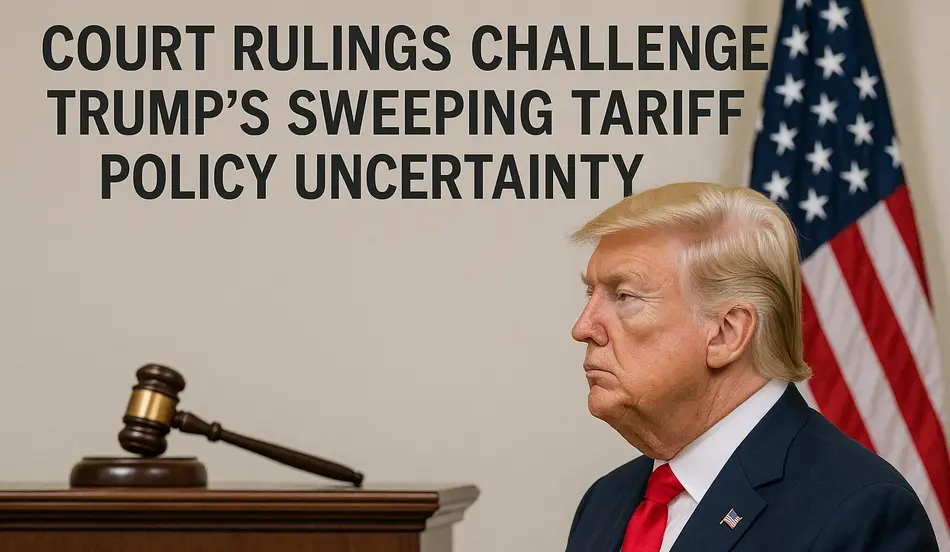Court Rulings Challenge Trump’s Sweeping Tariff Policy Uncertainty
In a significant blow to former President Trump’s economic agenda, the US Court of International Trade has struck down several key tariff initiatives, citing constitutional overreach. This tariff policy uncertainty introduces fresh complications for businesses already struggling to navigate America’s trade landscape.
Constitutional Challenges Mount
The court ruling specifically targeted Trump’s 10% blanket tariff rate and 20% tariff on Chinese imports, determining they represented a violation of separation of powers principles. According to NBC reporting, the ruling effectively lowers the US average tariff rate from 15% to 6.5%, though it doesn’t affect duties on autos, auto parts, or steel and aluminum.
Markets React Cautiously
Wall Street has historically recoiled at aggressive tariff announcements, and early market reactions showed modest relief following the court’s decision. However, financial analysts warn that tariff policy uncertainty continues to loom over economic forecasts, especially since both court orders are temporarily paused pending appeals.

The “TACO Trade” Phenomenon
Market-Created Terminology
Financial experts have coined a telling phrase for Trump’s approach to tariffs – the “TACO trade,” standing for “Trump Always Chickens Out.” When confronted with this term during a recent press conference, Trump appeared visibly agitated, calling it “a nasty question” while defending his approach as “negotiation.”
Low Pain Threshold Analysis
Robert Armstrong, US financial commentator for the Financial Times, explained the market’s perspective: “The serious idea underlying the TACO trade joke is that Trump has a very low pain threshold with these policies. There’s actually not very much he’s willing to sacrifice economically or politically to get these tariffs through.”
Economic Consequences of Tariff Policy Uncertainty
Expert Warnings About Trade War Realities
National security experts have long warned about mismatched expectations in trade confrontations with countries like China, which has demonstrated significantly higher tolerance for economic pain than the US consumer-driven economy. Companies looking to navigate this challenging environment may benefit from exploring opportunities with employers who have diversified supply chains.
Congressional Abdication of Authority
Charlotte Howard of The Economist criticized Congress for “continuing to lie down” rather than asserting its constitutional role in trade policy, allowing the executive branch to dramatically overreach its authority across virtually all imported goods.
According to the Peterson Institute for International Economics, tariff policy uncertainty has measurable negative effects on business investment, with companies delaying expansion plans and shifting resources to manage regulatory risks rather than focusing on growth and innovation.
Navigating Business Decisions During Trade Disputes
Businesses facing tariff policy uncertainty should consider several strategies:
• Diversify supply chains to reduce dependence on single countries
• Build contingency plans for rapid tariff changes
• Stay informed about trade policy developments and court challenges
• Consider developing expertise in trade compliance and international regulations
• Evaluate pricing strategies to accommodate potential tariff shifts
As financial markets continue to respond to each development in this evolving situation, businesses and investors alike must remain vigilant about how tariff policy uncertainty impacts their long-term planning and immediate operations.
What industries are most vulnerable to tariff policy uncertainty?
Industries with complex global supply chains face the greatest risks from tariff policy uncertainty, including electronics, automotive, and consumer goods sectors. Companies that rely heavily on imported components or materials from targeted countries like China must constantly prepare contingency plans for potential disruptions.
How is tariff policy uncertainty affecting US businesses?
Tariff policy uncertainty creates significant challenges for US businesses by making it difficult to plan supply chains, pricing strategies, and international partnerships. Companies facing potential sudden cost increases from tariffs must either absorb these costs, pass them to consumers, or restructure their supply chains – all expensive propositions that dampen growth.
How does tariff policy uncertainty affect consumer prices?
Tariff policy uncertainty typically leads to higher consumer prices as businesses build risk premiums into their pricing models. When companies aren’t sure if their import costs might suddenly increase by 10-20%, they often raise prices preemptively to create financial buffers against potential tariff shocks.
What economic indicators should investors watch during periods of tariff policy uncertainty?
During periods of tariff policy uncertainty, investors should closely monitor trade deficit numbers, manufacturing indices, retail sales data, and corporate earnings reports from import-dependent industries. Additionally, currency fluctuations and bond market movements often provide early signals of how tariff policies are affecting broader economic conditions.




